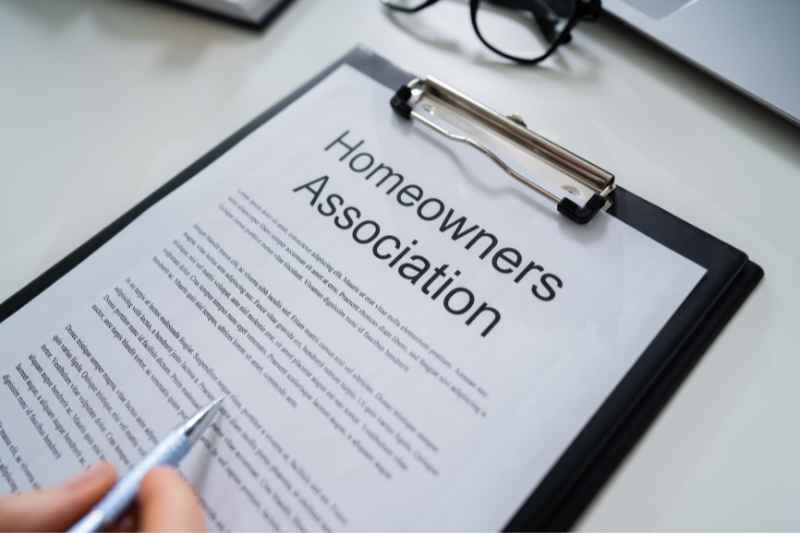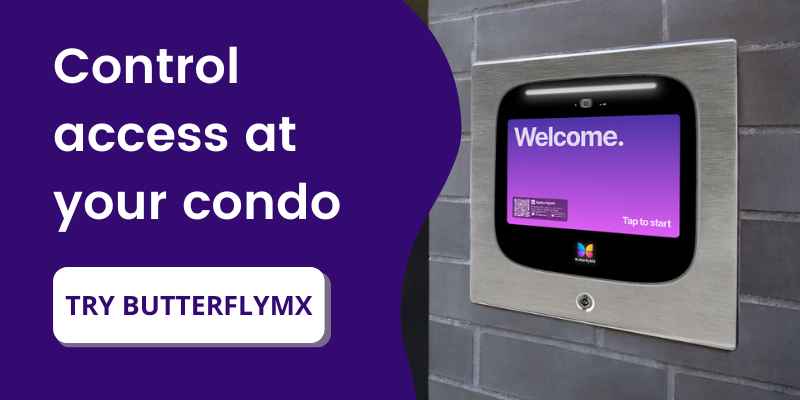Key takeaways
- Some key duties of an HOA president are leading and facilitating meetings, collaborating with board members, signing legal documents, resolving disputes, and leading the decision-making process.
- Key qualities of a great HOA president include strong leadership skills, the ability to stay organized, and strong communication skills.
- Six ways to navigate challenges as an HOA president are to handle conflicts and disputes swiftly, use a visitor management system, secure your package room, balance personal and board interests, ensure legal compliance, and invest in access control.

Beyond administrative duties and tasks, the main responsibility of HOA board members is to serve as advocates for the condo community. This often involves making important decisions that impact property values and quality of life. For instance, this could involve investing in essential amenities like a condo security system to protect the overall well-being of residents.
Read on to learn what the responsibilities of HOA board members are. Next, explore the key qualities of a successful HOA president. Finally, discover six ways to navigate challenges as an HOA president.
This guide covers:
- What are the duties of the president of an HOA?
- Key qualities of a successful HOA president
- What are the responsibilities of a HOA board of directors?
- 6 ways to navigate challenges as an HOA president
- Responsibilities of HOA board members FAQs
What are the duties of the president of an HOA?
There are a variety of standards and duties that HOA board presidents are expected to uphold.
Here are the main duties of an HOA president:
- Lead and facilitate meetings
- Uphold governing and legal documents
- Serve as a mediator and spokesperson
- Collaborate with board members
- Create and manage meeting agendas
- Sign legal documents
- Assign committees
- Resolve disputes
- Delegate tasks to committee members
- Oversee financial matters
- Lead the decision-making process
- Build community
- Communicate board decisions to other condo owners
Lead and facilitate meetings
The HOA president is in charge of ensuring that all board members and residents are informed about important issues, updates, and upcoming decisions during meetings.
Uphold governing and legal documents
Beyond ensuring compliance with local laws and regulations, legal documents provide the framework for maintaining property and community standards and resolving disputes. By adhering to these documents, the president helps protect property values and the collective interests of condo owners.
Serve as a mediator and spokesperson
By serving as a mediator, the president acts as a neutral party to facilitate constructive communication and find mutually acceptable resolutions to disputes. Additionally, as a spokesperson, the president speaks on behalf of the community — conveying important information, advocating for community interests, and fostering positive relationships.
Collaborate with board members
By encouraging collaboration across the board, the president can leverage fellow board members’ diverse expertise and perspectives to address unique challenges and maximize opportunities.
Create and manage meeting agendas
A well-structured agenda guarantees that important topics are addressed and time is utilized efficiently.
Sign legal documents
From approving vendor contracts and transactions to signing legal settlements, the president’s signature carries the authority of the HOA and binds the community to these terms.

Assign committees
Appointing committees empowers the president to distribute workloads evenly and use residents’ diverse skills and interests as a resource.
Moreover, empowering residents to contribute their expertise fosters a sense of ownership and accountability in community affairs. As a result, this collaborative effort encourages active participation in shaping the neighborhood’s future.
Resolve disputes
Whether conflicts arise between residents or vendors, timely and fair resolutions prevent escalation and build trust in the HOA’s ability to address concerns effectively. As a result, this fosters a positive living environment for all residents.
Delegate tasks to committee members
Effective delegation boosts the HOA’s ability to achieve its goals and serve the best interests of condo owners.
Oversee financial matters
The president plays a key role in ensuring transparent and responsible financial management, such as collecting and assigning special assessment fees and budgeting, planning, and monitoring expenditures.
Lead the decision-making process
Guiding discussions, weighing options, and encouraging a consensus among board members ensures that the interests of residents are represented fairly.
Build community
Organizing social events and fostering healthy relationships amongst residents helps create a vibrant and supportive community environment.
Communicate board decisions to other condo owners
Keeping residents informed about important developments, decisions, and policies that affect their living environment promotes trust and confidence in the board’s decision-making process. Moreover, it gives residents an opportunity to voice concerns or provide feedback.

Key qualities of a successful HOA president
Balancing administrative duties with a genuine dedication to represent the best interests of homeowners empowers an HOA president to shape the character and vitality of the community they serve.
Here are some key characteristics of an HOA president:
- Display strong leadership skills. Decisive decision-making empowers the president to guide the HOA in addressing challenges and implementing policies that serve the best interests of residents.
- Stay organized. Maintaining records, schedules, and legal documentation ensures that board meetings run smoothly.
- Stay-up-to-date on the latest proptech trends. Staying up-to-date on industry trends and investing in essential amenities like access control increases property values and improves the overall quality of life for residents.
- Communicate effectively. Keeping residents informed about important decisions, policies, and upcoming events guarantees that the entire community is on the same page.
- Uplift your community. Uplifting the community creates a welcoming and supportive environment in which all your residents can thrive.
What are the responsibilities of a HOA board of directors?
The primary responsibility of HOA board members is to represent and uplift the collective interests of condo owners.
Here are other important condo association board member responsibilities:
- Hire or oversee property management companies
- Delegate tasks to administrative and maintenance staff
- Establish budgets
- Adopt and enforce community rules
- Maintain common areas
- Employ attorneys or accountants
HOA officer positions and board structure
HOA officers each have different roles and responsibilities that create balance and harmony in an HOA board. What’s more, they work together to serve the greater interests of the community.
Here are the duties and responsibilities of homeowners association officers:
- President. An HOA president presides over board meetings, implements and enforces community rules and guidelines, and manages finances. What’s more, HOA presidents are also expected to take the lead in communicating with residents and representing the HOA to external stakeholders.
- Vice President. The HOA vice president supports and assists the president in their duties and acts as their substitute in their absence.
- Secretary. Secretaries are responsible for record-keeping, tracking legal documentation, and completing other essential administrative tasks.
- Treasurer. HOA treasurers are responsible for overseeing and managing the board’s financial affairs.
6 ways to navigate challenges as an HOA president
Navigating the unique challenges of a condo community can be difficult, but there are ways to mitigate these struggles and serve everyone’s best interests.
Here are six ways to navigate common condo community challenges as an HOA president:
- Handle conflicts and disputes swiftly
- Use a visitor management system
- Secure your package room
- Balance personal and board interests
- Ensure legal compliance
- Invest in access control
1. Handle conflicts and disputes swiftly
Resolving issues between residents swiftly and promptly maintains a peaceful living environment for everyone. By proactively addressing conflicts, the HOA president can mitigate tensions and prevent disruptions that can potentially escalate into larger problems in the future.

2. Use a visitor management system
Visitor management systems offer a comprehensive way to streamline entry for guests at your condo community.
Here are some benefits of visitor management systems:
- Improve security. Manually signing in visitors makes it difficult to keep track of visitors effectively. As a result, this can lead to unauthorized guests accessing the property and shared amenity spaces, posing a potential risk to residents.
- Save time. Implementing a system that automatically checks in visitors empowers administrative staff to focus on other essential duties.
- Real-time monitoring. Visitor management systems offer you the ability to monitor visitor entry events in real-time. So, in the event of a security incident, it’s easy to pinpoint the culprit.
3. Secure your package room
Package theft is a key concern for most condo communities. What’s more, couriers dropping off packages in the lobby or front desk area can be an eyesore for residents and visitors. Luckily, a secure package room significantly reduces the risk of package theft and improves resident satisfaction.
Here’s how a secure package room can benefit your community:
- Package security. A secure package room provides a controlled environment for storing packages, reducing the risk of theft or tampering. What’s more, modern package rooms send real-time notifications once a package is delivered.
- Large storage capacity. Holistic package rooms can better accommodate large packages like furniture than lockers or PO boxes.
- Delivery passes. Modern package rooms send delivery passes so that couriers can access the property and drop off packages securely.
4. Balance personal and board interests
Prioritizing the community’s collective interests allows the HOA president to build trust among board members and residents.
What’s more, a balanced approach helps maintain the integrity of the HOA’s overall decision-making process, ensuring that decisions are made in the best interests of the entire community rather than individual preferences.
5. Ensure legal compliance
Adhering to local laws, regulations, and legal documents empowers an HOA president to prevent legal disputes, fines, or liabilities that may arise from non-compliance.
As a result, this proactive approach builds transparency and trust among residents. What’s more, it demonstrates the HOA’s commitment to upholding ethical standards and protecting homeowners’ interests.
6. Invest in access control
Investing in an end-to-end access control solution is one of the best ways to solve the unique challenges that can arise in condo communities.
Here’s how access control benefits the HOA and condo owners:
- Improve security. Comprehensive access control systems significantly reduce the likelihood of unauthorized visitors accessing your property.
- Streamline access. Access control systems can streamline entry for your property’s residents, guests, staff, and vehicles for convenient yet secure access.
- Send visitor passes. Visitor passes empower residents and staff to grant temporary access to guests or service providers from their smartphones.
- Remote access management. Cloud-based access control systems empower residents and staff to grant access from anywhere in the world. This is especially convenient for residents who rent out their properties via Airbnb.
- Audit trails. Access control systems maintain detailed logs of all entry and exit activity in condo communities. They can even provide time-and-date-stamped photos of all entry events in the event of a security incident.
- Integrations. Access control systems can be integrated with other building management systems, such as security cameras, video intercoms, property management systems, alarms, and smart locks.
Watch how ButterflyMX works:
Responsibilities of HOA board members FAQs
Here are some commonly asked questions about the responsibility of HOA board members:
- How much power does the president of an HOA have?
- What qualities should an HOA board member have?
- What happens when a board member breaches fiduciary duty?
- Do HOA board members get paid for their work?
How much power does the president of an HOA have?
The president of an HOA has just as much power as the CEO of a company. With this in mind, HOA presidents are expected to be the authority on condo board rules, handle and delegate procedural duties, and serve as the spokesperson for the community.
What qualities should an HOA board member have?
HOA board members should be organized, consistent, responsive, and communicative.
Additionally, HOA board members should abide by and uphold the HOA board of directors code of conduct.
What happens when a board member breaches fiduciary duty?
Unethical HOA board members who breach fiduciary duty can be sued by fellow condo owners and held personally liable for the community’s losses.
Do HOA board members get paid for their work?
In most cases, HOA board members don’t get paid because they serve as volunteers for the condo community. What’s more, it’s the fiduciary responsibility of HOA board members to serve their condo community without financial benefit or compensation.







